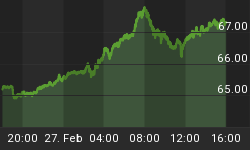The central bankers of the two key western economies have pulled out all the monetary stops in recent weeks. Our mandarins of money assure us that this time their efforts will be sufficient - that this "unlimited" expansion in central bank balance sheets/money-supply will provide the raw material for a rebirth of real growth in the west.
I would disagree - the western economies currently have in place the raw materials for stagflation:
- Aging populations;
- Large unfunded public liabilities;
- High total debt-to-GDP levels;
- Low savings rates;
- Overhang of unliquidated mal-investments;
- Growing state sectors; and
- Large fiscal deficits.
The monetary authorities are simply adding more of the critical ingredient - devaluing currencies. All of the issues above have been well documented over the last few years and yet strangely stagflation does not seem to be on the market's radar - a Google trends search for "stagflation" reveals what seems to be a certain complacency on the issue.

I think we will begin to see a change in market perceptions - and more importantly investment positioning - as the consequences of the unwavering commitment of the central bankers of the worlds two largest economies, the US and the EU, to unlimited money printing become apparent. Risk assets of all kinds, of course, have been showing considerable life as of late, but over time I would expect the hard asset sub-category to be the winner and financial assets, particularly sovereign debt, to be the loser.
Now matter how much Chairman Bernanke would like to believe to the contrary, currency debasements do not generate economic recoveries. To indulge in what has become a trite observation, if it were so Zimbabwe would be a prosperous country. Likewise, to keep the money supply growing aggressively in the stagnant economies of the west will not produce the desired outcome of real growth and increasing employment.
By insisting on printing over the systemic solvency issues in the financial sector, by actively preventing the liquidation of decades of mal-investment, by subsidizing speculation and consumption to the detriment of production (and so on) central bankers will not create a recovery. Unless these problems are addressed they are creating a volatile, inflationary environment with poor real growth dynamics - i.e. the ideal raw materials for stagflation in the west. Stagflation combined with volatility presents the average person with a very difficult investment environment, one where even simple capital preservation becomes a challenge.
Of course - the banking system bonus machine might be saved and in the end perhaps that's all that really matters.















